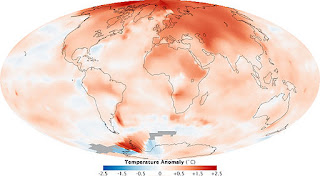An Interdisciplinary Discussion on Climate Change
Recently I attended “Climate Change, Science and Society: A Multidisciplinary Discussion” hosted by the New York Academy of Sciences and arranged by Wiley WIRES Climate Change.
 |
| By Victor Korniyenko (From Wiki.) [CC BY-SA 3.0], via Wikimedia Commons |
The speakers were: Stephen Rose, an economist with the Electric Power Research Institute , Lauren Chamblis of the Cornell University Agricultural Experiment Station a science communications specialist and a former journalist, and David Rind, a NASA/GISS climate scientist emeritus. The interdisciplinary aspect of the talk was unique and this talk was well worth attending
.
.
The climate scientist David Rind, spoke about climate change in a way I hadn’t considered before. New models are now predicting an increase in temperature of 4 degrees. That may not seem like much he said, “But global temperatures were only 4 degrees lower when there was a 3 kilometer thick glacier where we sit right now” (downtown Manhattan). Interestingly, he first showed the early models which showed areas of increased/decreased precipitation and areas of increased/decreased evaporation. Then he showed a revamped model which combined these two data sets to give a drought prediction model. A four degree increase in global temperature showed a world engulfed by drought conditions by 2100, clearly beyond society’s ability to provide for itself.
I’ve seen many predictions that dealt with climate change in terms of potential economic change - flooded and abandoned cities, lost ways of life etc. However, Steven Roses’s presentation was the first time a talk really boiled down the approaches to climate change in an economist's terms. Obviously, no one intends to release greenhouse gases; rather, we produce these gases as a result of our primary economic activities – i.e. traveling or making widgets. Economists separate the activities (or intentions) and the unintended consequences (or the externalities) which can be either positive or negative. So for an economist the production of greenhouse gasses, aerosol or particulate pollution, and eventual global climate change are externalities which are a consequence of our economic activities. It’s helpful to separate what we want to do (which is get where we want to go and make the widgets and gizmos) from the greenhouse gases that they produce. That is, we want to maximize the good while reducing the bad - none of us want to return to the preindustrial world. I always find how economists approach a problem particularly fascinating which is why I enjoyed reading Freakonomics.
Later in his talk, Steven presented a number of statistical climate forecast models that were compared to examine the effects of a global strategy to reduce greenhouse gases. Essentially, the models predict that if all nations agreed to limit the production of greenhouse gasses then there is still time to avert a climatic catastrophe. However, all the models are in agreement that if policies aren’t implemented soon then more drastic changes will need to be made. Furthermore, and perhaps more disturbingly, if the BRIC countries (Brazil, Russia, India and China) don’t participate, any hope of changing global CO2 levels is infeasible. Yet, the BRIC countries are unanimous in their desire to hold off any greenhouse emissions treaties. To them it’s an issue of fairness - the west after all was able to pollute with impunity for more than a hundred years. Of course, it doesn’t really matter what’s fair or not. If temperatures rise as much as predicted, it will adversely affect all four countries. This of course is a very timely discussion given the current rancor about developing countries cutting back on CO2 emissions at the current talks to extend the Kyoto protocol.
Lauren Chamblis, spoke about how scientists must communicate more effectively about climate change, and how the public is not as antagonistic towards climate science as is commonly believed, and that people honestly would like to do something about climate change. This is a fact well worth remembering given the trouble Mitt Romney seems to have gotten into for suggesting he was for combating global warming.
We know much about global climate change and yet there is so much more we don’t know and it is what we don’t know that will undoubtedly influence the accuracy of climate models. However, there are two things to keep in mind here. As Steven said in economic terms, the longer we wait to see how bad this thing will be the more drastic the changes we will need to make in our lives and societies to stave off the worst global climate change. Essentially, we are taking less drastic options off the table with each passing year. Secondly, thus far every climate model out there has widely underestimated the effect of climate change on the Antarctic and arctic ice sheets, so clearly there is way more going on here, but what we know so far seems to indicate that things are getting real worse real fast.


Comments
Post a Comment